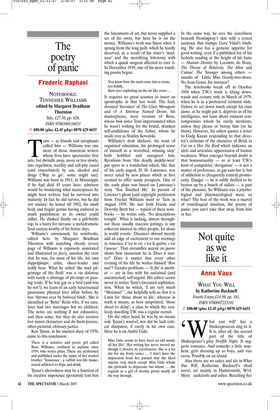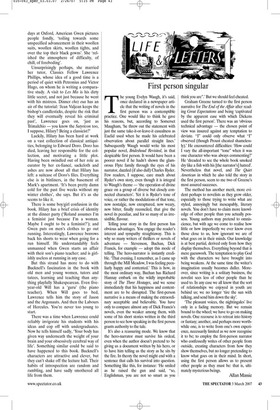Not quite as we like it
Anna Vaux
WHAT YOU WILL by Katherine Bucknell Fourth Estate,£14.99, pp. 341, ISBN 9780007225101 ✆ £00.00 (plus £2.45 p&p) 0870 429 6655 ‘What you will’ has a Shakespearean ring to it. It is, after all, the second part of the title of Shakespeare’s play Twelfth Night. It suggests romance. And comedy; a little mayhem, girls dressing up as boys, and vice versa. Possibly on an island.
Alas there are no cakes and ale in What You Will, Katherine Bucknell’s third novel, set mainly in Hamersmith, W14. More sackcloth and ashes. Recalling her days at Oxford, American Gwen pictures people fondly, ‘toiling towards some unspecified advancement in their woollen suits, woollen skirts, woollen tights, and over the top their black gowns’. She ‘relished the atmosphere of difficulty, of chill, of foreboding’.
Unsurprisingly perhaps, she married her tutor, Classics Fellow Lawrence Phillips, whose idea of a good time is a period of quiet with Petronius and Victor Hugo, on whom he is writing a comparative study. A visit to Les Mis is his dirty little secret, and not just because he went with his mistress. Dinner chez eux has an air of the tutorial: ‘Jean Valjean keeps the bishop’s candlesticks, despite the risk that they will eventually reveal his criminal past’, Lawrence goes on, ‘just as Trimalchio — you know the Satyricon too, I suppose, Hilary? Being a classicist?’ Luckily, Hilary has been hard at work on a vast collection of classical antiquities, belonging to Edward Doro. Doro has died, leaving her responsible for the collection, and motivating a little plot. Having been swindled out of her role as curator by her ex-fiancé, sackcloth and ashes are now about all that Hilary has left: a suitcase of Doro’s files. Everything else is in binliners, in the basement of Mark’s apartment. ‘It’s been pretty damn cold for the past five weeks without my winter clothes’, she says. But it’s as she seems to like it.
There is some boy/girl confusion in the book. Hilary has a brief crisis of identity at the dinner party (‘Roland assumes I’m a feminist just because I’m a woman. Maybe I ought to be a feminist?’); and Gwen puts on men’s clothes to go out running. Interestingly, Lawrence borrows back his shorts to wear when going for a run himself. He understandably feels unmanned when Gwen starts an affair with their son’s piano teacher; and is girlishly useless at running in any case.
But this strand has more to do with Bucknell’s fascination in the book with old men and young women, tutors and tutees, learning and teaching than anything playfully Shakespearean. Even fiveyear-old Will has a ‘guru’ (the piano teacher). When Will goes to bed, Lawrence tells him the story of Jason and the Argonauts. And then the Labours of Hercules. You’re never too young to start.
There was a time when Lawrence could reliably invigorate his students with his ideas and cop off with undergraduates. Now he tells himself sadly, ‘Your body has given way underneath the weight of your brain and your obsessively cerebral way of life’. Something similar could be said to have happened to this book. Bucknell’s characters are attractive and clever, but they can’t shake off the lecture hall. Their habits of introspection are random and rambling, and have sadly smothered all life from them.











































































 Previous page
Previous page